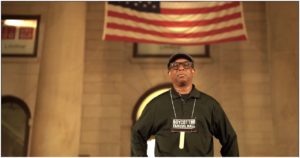Have a question about Philly’s neighborhoods or the systems that shape them? PlanPhilly reporters want to hear from you! Ask us a question or send us a story idea you think we should cover.
Last June, City Council passed a $6.8 billion budget with a string of annual tax cuts meant to help individual businesses and improve Philadelphia’s economic outlook.
Now, a grassroots organization is calling on lawmakers to reconsider a decision they fear will hurt the city’s most vulnerable residents — by shifting the taxpayer burden onto them and harming critical city services, including those provided by recreation centers and libraries.
“Obviously, they are lacking a moral compass to be able to, in the midst of an already broke city, give the city away to billionaires and create our current crisis. This is a man-made, fabricated crisis,” said Rev. Gregory Edwards, executive director of POWER Interfaith.
On Monday, Edwards’ group kicked off its ambitious campaign with a news conference inside St. Vincent de Paul Catholic Church in Germantown, which offers a variety of free, essential services to low-income residents through the nonprofit Face to Face.
As a stream of people filed in and out of the church, speaker after speaker questioned the priorities of the city’s elected officials, who they worry will raise property taxes to make up for scheduled revenue losses from the business income and receipts tax, or BIRT.
The business levy is the third-largest source of city tax revenue after the wage tax and the property tax. It requires companies to pay 0.1415% of their total sales, and if applicable, another 5.81% of their profits.
BIRT was projected to bring in more than $600 million in tax revenue in this year’s budget, according to the city manager’s quarterly tax report.
An Tran, a member of POWER Interfaith, believes the tax cuts will have disastrous effects on the city’s most vulnerable people. (Aaron Moselle/WHYY)
“When you take that much money out of the equation, it has to come from somewhere else. And we know where ‘somewhere else’ usually means in Philadelphia — it’s the poor, it’s the working people, the Black and brown families already hanging on by a thread,” said An Tran, a Germantown resident and member of POWER Interfaith.






